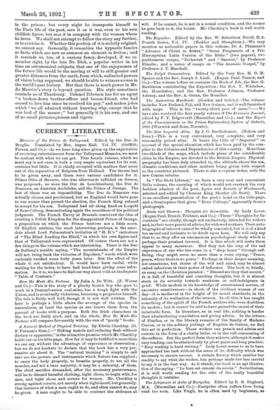Seeds and Sheaves : Thoughts for Incurables. By Lady Lovat.
(Kogan Paul, Trench, Triibner, and Co.)—These "Thoughts for In- curables" are chiefly, though not exclusively, intended for widows and, in their more practical advice, for widowed mothers. Their auto- biographical interest cannot be wholly concealed, but it is of a kind too sacred and intimate to be dwelt upon here. We will only say that to us they offer an unconscious psychological study which is perhaps their greatest interest. It is this which will make them appeal to many mourners. Had they not the ring of the sad experience of one who has come to a "deep heart" through suf- fering, they might seem no more than a voice crying, "Peace, peace, where there is no peace." Feelings in their deeper meaning, not sensations, but states of the will and mind, may be almost called infectious in their power of influence. The book is, briefly, an essay on the Christian paradox; "Blessed are they that mourn." It is full of beautiful and consoling thoughts, but it is almost stern in its severity towards weakness or self-indulgence in grief. While modern in its knowledge of overstrained nerves, of excessive sensitiveness—in short, of the civilised woman of our day—it is mediteval in the height of its moral standards, in the intensity of its realisation of the unseen. In all this it ha.s caught something of the spirit of the French authors who were doubtless its models ; but it cannot be said to have gained the secret of their inimitable form. In literature, as in real life, nothing is harder than administering consolation and giving advice. In the letters.
of Nalon, or in the literary remains of the family of Madame Craven, or in the solitary jottings of EugSnie de Garin, we find this art in perfection. These writers can preach and advise and console in the form of a chatty letter, or in the self-communing of the sufferer. But the perfect form they achieve, although it makes easy reading, can be attained only by great pains and long practice.
"Easy reading is hard writing." Lady Lovat seems to us to have approached her task without the sense of its difficulty which was necessary to ensure success. A certain fluency which enables her readily to say what she wishes, has perhaps made her less careful to say it in the best way. As it stands, the book is an apt illustra- tion of the saying : "Le bien eat ennemi du mieux." Nevertheless, it is well worth reading for the sake of the really beautiful thoughts it contains.


































 Previous page
Previous page